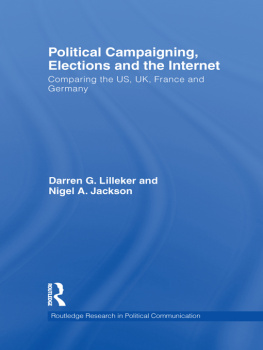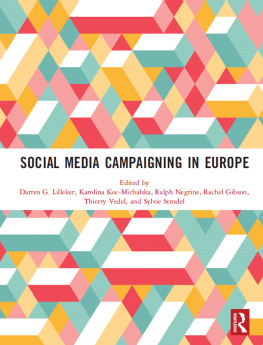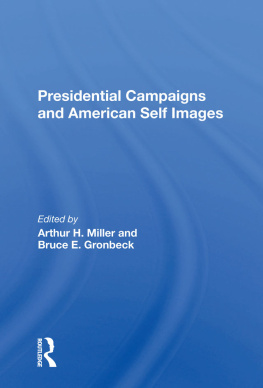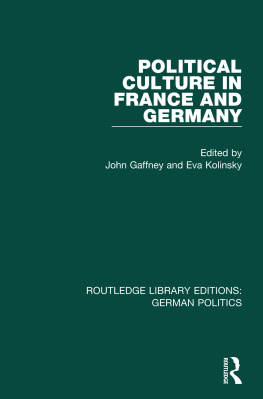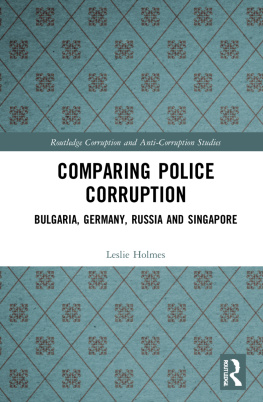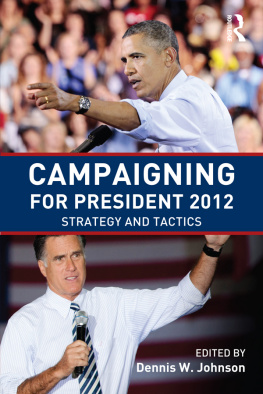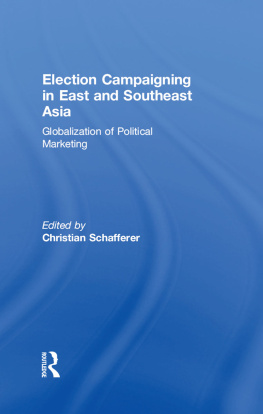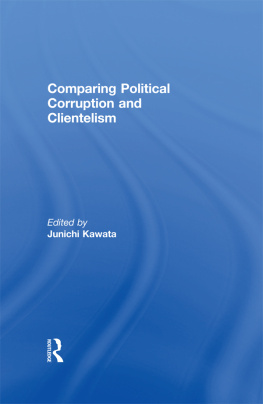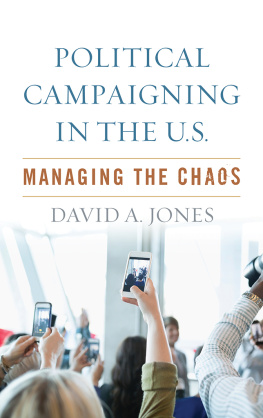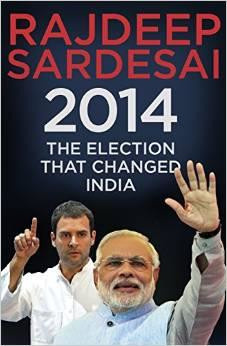Political Campaigning, Elections and the Internet
The Internet first played a minor role in the 1992 US Presidential Election, and has gradually increased in importance so that it is central to election campaign strategy. However, election campaigners have, until very recently, focused on Web 1.0: websites and email.
Political Campaigning, Elections and the Internet contextualises the US Presidential Campaign of 2008 within three other contests: France 2007; Germany 2009; and the UK 2010. In offering a comparative history of the use of the Internet as an election tool, the authors are able to test the optimistic view that the Internet is transforming elections while also mapping the role the Internet plays and performs for parties and candidates. Lilleker and Jackson offer in-depth analysis demonstrating how interactive Web 2.0 online tools, including weblogs, social networking sites and file-sharing sites, are utilised and evaluate the role of these tools in the marketing and branding of parties and candidates.
Examining the interactivity between candidate, party and voter, this important book will be of strong interest to students and scholars of political science, elections, international relations and political communication. It will be of value to those within public relations, marketing and related communication and media programmes.
Darren G. Lilleker is Senior Reader, The Media School, Bournemouth University, UK.
Nigel A. Jackson is Lecturer, Plymouth Business School, University of Plymouth, UK.
Routledge research in political communication
1 Political Campaigning in Referendums
Framing the referendum issue
Claes H. de Vreese and Holli A. Semetko
2 The Internet and National Elections
A comparative study of web campaigning
Edited by Nicholas W. Jankowski, Randolph Kluver, Kirsten A. Foot and Steven M. Schneider
3 Global Political Marketing
Edited by Jennifer Lees-Marshment,
Jesper Strmbck and Chris Rudd
4 Political Campaigning, Elections and the Internet
Comparing the US, UK, France and Germany
Darren G. Lilleker and Nigel A. Jackson
Political Campaigning, Elections and the Internet
Comparing the US, UK, France and Germany
Darren G. Lilleker and Nigel A. Jackson
First published 2011
by Routledge
2 Park Square, Milton Park, Abingdon, Oxon OX14 4RN
Simultaneously published in the USA and Canada
by Routledge
711 Third Avenue, New York, NY 10017
Routledge is an imprint of the Taylor & Francis Group, an informa business
2011 Darren G. Lilleker and Nigel A. Jackson; Eva Schweitzer, her contribution
The right of Darren G. Lilleker and Nigel A. Jackson to be identified as authors of this work has been asserted by them in accordance with sections 77 and 78 of the Copyright, Designs and Patents Act 1988.
Printed and bound in Great Britain by TJI Digital, Padstow, Cornwall
All rights reserved. No part of this book may be reprinted or reproduced or utilised in any form or by any electronic, mechanical, or other means, now known or hereafter invented, including photocopying and recording, or in any information storage or retrieval system, without permission in writing from the publishers.
British Library Cataloguing in Publication Data
A catalogue record for this book is available from the British Library
Library of Congress Cataloging-in-Publication Data
Lilleker, Darren G. Political campaigning, elections, and the internet : US, UK, Germany, and France / Darren G. Lilleker and Nigel A. Jackson.
p. cm. (Routledge research in political communication ; 4)
1. Internet in political campaigns. 2. ElectionsComputer network resources. 3. Comparative government. I. Jackson, Nigel A. II. Title.
JF1001.L55 2011
324.70285'4678dc22 2010037473
ISBN: 978-0-415-57218-7 (hbk)
ISBN: 978-0-203-82943-1 (ebk)
To those whose support has made this book possible, and to the future Eliot, Toby, Mark, Kayleigh and Yazmine.
Contents
EVA JOHANNA SCHWEITZER
Illustrations
Figures
Tables
Contributors
Preliminary work which shaped the conceptual framework and methodology was contributed by Casilda Malagon Ibanez in the process of research on the MA Corporate Communication (Bournemouth University) under the supervision of Dr Lilleker, and a pilot study conducted into the French Presidential candidate website which was published in the European Journal of Communication (Lilleker and Malagon 2010).
was commissioned, and was produced by Eva Schweitzer, University of Mainz, Germany.
Preface
We suggest that elections can be best understood by understanding different aspects. Campaigns can be seen as consisting of several discrete but interconnected elements, as well as the sum of all elements. Audiences, potential voters perhaps, can accidentally or intentionally be exposed to all elements, or one small aspect of the campaign. Elections are part of a competitive process between political actors such as political parties and individual candidates, at national, regional and local level. These actors seek to gain competitive advantage, and this drives them to consider using and mastering a range of new and long-standing techniques and tools. Yet, at the same time elections play a key role in liberal democracies, as they are very often the main way individual citizens participate in politics. Therefore, winning is not alone all that matters. Elections may have an obvious short-term goal of maximising support at the voting booth, but there are also longer-term impacts that the conduct of campaigns can have on attitudes towards, and trust in, the political and democratic process. Thus, it is argued that how political actors interact with citizens in chasing the quick sell, can have a key bearing on the long-term health of each individual countrys democracy. Elections are health checks of the body politic, telling us how strong individual political actors are vis--vis their competitors, but also the overall heartbeat of the political system.
In the past ten years or so there has been increasing interest in the potential impact of the Internet on the body politic, by and large outside of election campaigns. At the same time, there has also been growing interest in the impact of the Internet on the techniques used by professional campaigners during the short election period. This book has arisen because we were interested in assessing both of these drivers of interest in election campaigns. Thus far it seems we have to either look at the impact of the Internet on democracy between elections, or how the Internet is utilised as a tool for potentiating the maximisation of vote winning. We seek, however, to see if the study of online election campaigns has to be an either/or situation. In short, we are seeking to assess whether we can now identify a discrete Elections 2.0 which combines the practical needs of the permanent campaign with those of encouraging greater elector-elected dialogue between voters and the elected.
The ideas contained within this book have been several years in incubation prior to their reaching maturity. We had previously focused essentially on the use of e-campaigns in one country, the UK, and that mostly in peacetime between elections. However, we felt that this provided only a partial insight, a sense which was magnified by the fact that the Internet has no national boundaries. Moreover, we felt that the development of the Internet was potentially changing political discourse. From the very outset, debates have centred on the extent to which the Internet and associated technologies would enhance democracy, but the debates have primarily concerned their possible impact on governance and democracy. We feel that, potentially, Web 2.0 might move on this debate so that within election campaigns, political participation is not limited to voting. This book seeks to test whether there is some substance to this view, or whether it is nave pie in the sky thinking.


